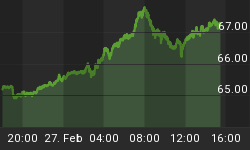Thursday's markets weren't as thrilling, enthralling, or scary as Wednesday's action, but make no mistake: history is moving forward. There are some bad parts of that history in our future, so that's not necessarily encouraging...
Initial Claims fell to 414k, with a small upward revision to last week causing it to be viewed as just about on-target but with a better-looking trajectory. There was not a lot of question that the initial spike to 480k or so would be retraced; the real question is how much of the gap wider was Japan-tsunami-related and how much was not. Not all of the weakening manufacturing surveys occurred in areas where there is a lot of auto or auto parts manufacturing. Will claims improve to 375k or only 414k? What is the new underlying rate? Those are the questions we have yet to answer. It does appear that the new underlying rate is higher than the 490k or so that prevailed before March, but we don't know if the impulse is dying out yet or not.
Housing Starts also improved, to 560k with an upward revision to the prior month. This is good news, maybe, but it's probably fairer to call it irrelevant news...560k is right in the middle of the range that has prevailed since 2009, and considerably off the 2mm+ pace of early 2006.
The Philly Fed index (see Chart) was pretty bad. It printed -7.7 versus expectations for +7.0. The level is the worst reading since 2009. It's a relative index, which means that technically business conditions in the Philly area actually deteriorated in May. They didn't merely decelerate, as would be the case if the index fell from say +30 to +10, but actually got worse on the month. The Number of Employees subindex went from +22.1 to a veritable standstill at +4.1; New Orders went from +5.4 to -7.6. It's looking like a hot summer in Philly.

Philly Fed is not encouraging.
The bond market was extending its rally, but stocks were bouncing when a story came out saying that "the Basel Committee on Banking Supervision is considering proposed capital surcharges of as much as 3.5 percentage points that the largest banks may face if they grow any bigger." Equity investors don't like it when policymakers lean on their companies, and stocks turned south at that point.
The idea is not particularly unique - after all, Major League Baseball has been applying a similar sort of 'luxury tax' idea on the Yankees and other big "firms" for a while now. Indeed, I made a similar point in November 2009 in an article called "Sauropods With Thermal Underwear" and also in one called 'Too Big To Fail' And The One-Way Arrow Of Antitrust' (this latter is only available at the moment to registered customers of Enduring Investments). It is a reasonable concept - charge banks for the "Too Big To Fail" insurance. Small banks shouldn't have to pay for that insurance, because they're allowed to fail. This makes sense to me.
Stocks recovered late in the day, with the S&P bouncing off the 200-day moving average (at 1257.90, in case you're watching it too), but the outlook remains poor. Bonds managed to rally a little bit as well. To call the situation delicate is perhaps an understatement.
There is no data of note that is due on Friday, but there will be an increased preoccupation with examining the headlines on Greece to divine whether something important will happen over the week. This afternoon Alan Greenspan said to Charlie Rose that a Greek default is "almost certain," and joined Bob Shiller as noted economists who have recently raised the specter of a return to recession. If even Greenspan has figured out that a Greek default is just a matter of time, how long can it be before it becomes actuality?















